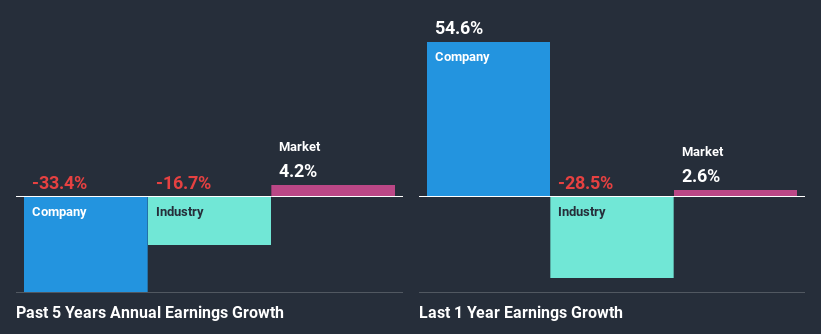- South Korea
- /
- Auto Components
- /
- KOSDAQ:A170030
Hyundai Industrial Co., Ltd.'s (KOSDAQ:170030) Fundamentals Look Pretty Strong: Could The Market Be Wrong About The Stock?

With its stock down 13% over the past three months, it is easy to disregard Hyundai Industrial (KOSDAQ:170030). However, stock prices are usually driven by a company’s financials over the long term, which in this case look pretty respectable. Particularly, we will be paying attention to Hyundai Industrial's ROE today.
Return on equity or ROE is a key measure used to assess how efficiently a company's management is utilizing the company's capital. Simply put, it is used to assess the profitability of a company in relation to its equity capital.
See our latest analysis for Hyundai Industrial
How To Calculate Return On Equity?
The formula for return on equity is:
Return on Equity = Net Profit (from continuing operations) ÷ Shareholders' Equity
So, based on the above formula, the ROE for Hyundai Industrial is:
7.9% = ₩8.5b ÷ ₩109b (Based on the trailing twelve months to September 2020).
The 'return' is the profit over the last twelve months. Another way to think of that is that for every ₩1 worth of equity, the company was able to earn ₩0.08 in profit.
What Is The Relationship Between ROE And Earnings Growth?
So far, we've learned that ROE is a measure of a company's profitability. Based on how much of its profits the company chooses to reinvest or "retain", we are then able to evaluate a company's future ability to generate profits. Assuming everything else remains unchanged, the higher the ROE and profit retention, the higher the growth rate of a company compared to companies that don't necessarily bear these characteristics.
A Side By Side comparison of Hyundai Industrial's Earnings Growth And 7.9% ROE
On the face of it, Hyundai Industrial's ROE is not much to talk about. Although a closer study shows that the company's ROE is higher than the industry average of 3.4% which we definitely can't overlook. However, Hyundai Industrial's five year net income decline rate was 33%. Remember, the company's ROE is a bit low to begin with, just that it is higher than the industry average. Therefore, the decline in earnings could also be the result of this.
As a next step, we compared Hyundai Industrial's performance with the industry and found thatHyundai Industrial's performance is depressing even when compared with the industry, which has shrunk its earnings at a rate of 17% in the same period, which is a slower than the company.

The basis for attaching value to a company is, to a great extent, tied to its earnings growth. It’s important for an investor to know whether the market has priced in the company's expected earnings growth (or decline). By doing so, they will have an idea if the stock is headed into clear blue waters or if swampy waters await. Is A170030 fairly valued? This infographic on the company's intrinsic value has everything you need to know.
Is Hyundai Industrial Using Its Retained Earnings Effectively?
When we piece together Hyundai Industrial's low three-year median payout ratio of 25% (where it is retaining 75% of its profits), calculated for the last three-year period, we are puzzled by the lack of growth. This typically shouldn't be the case when a company is retaining most of its earnings. So there might be other factors at play here which could potentially be hampering growth. For instance, the business has faced some headwinds.
Only recently, Hyundai Industrial stated paying a dividend. This likely means that the management might have concluded that its shareholders have a strong preference for dividends.
Summary
Overall, we feel that Hyundai Industrial certainly does have some positive factors to consider. Yet, the low earnings growth is a bit concerning, especially given that the company has a respectable rate of return and is reinvesting a huge portion of its profits. By the looks of it, there could be some other factors, not necessarily in control of the business, that's preventing growth. While we won't completely dismiss the company, what we would do, is try to ascertain how risky the business is to make a more informed decision around the company. Our risks dashboard would have the 2 risks we have identified for Hyundai Industrial.
If you’re looking to trade Hyundai Industrial, open an account with the lowest-cost* platform trusted by professionals, Interactive Brokers. Their clients from over 200 countries and territories trade stocks, options, futures, forex, bonds and funds worldwide from a single integrated account. Promoted
Valuation is complex, but we're here to simplify it.
Discover if Hyundai Industrial might be undervalued or overvalued with our detailed analysis, featuring fair value estimates, potential risks, dividends, insider trades, and its financial condition.
Access Free AnalysisThis article by Simply Wall St is general in nature. It does not constitute a recommendation to buy or sell any stock, and does not take account of your objectives, or your financial situation. We aim to bring you long-term focused analysis driven by fundamental data. Note that our analysis may not factor in the latest price-sensitive company announcements or qualitative material. Simply Wall St has no position in any stocks mentioned.
*Interactive Brokers Rated Lowest Cost Broker by StockBrokers.com Annual Online Review 2020
Have feedback on this article? Concerned about the content? Get in touch with us directly. Alternatively, email editorial-team (at) simplywallst.com.
About KOSDAQ:A170030
Hyundai Industrial
Manufactures and sells automotive seat components in South Korea and internationally.
Excellent balance sheet second-rate dividend payer.
Market Insights
Community Narratives




